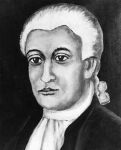Week of October 17-23
October 17
1720—Jupiter Hammon, the first Black American poet, is born in slavery. He was a Calvinist and self-educated writer.
 |
| PRINCE HALL |
1787—Led by Black Mason Prince Hall, free Boston Blacks petition the Massachusetts legislature for equal school facilities for African-American children. In addition to spreading Freemasonry among Blacks, Hall became the most prominent Black leader of the period. For reasons which are not entirely clear, records show there were at least 21 men named “Prince Hall” living in Massachusetts at the time.
1871—President Ulysses Grant suspends the writ of habeas corpus in nine South Carolina counties in order to combat a Ku Klux Klan terror campaign against Blacks and some progressive Whites. Grant pretty much crushed the Klan during this period. It would not rise again until the 1920s.
1888—The nation’s first Black bank—Capital Savings—is chartered in Washington, D.C. by a group known as the Order of the True Reformers. The now little known but once influential group set up chapters throughout the South and advocated Black self-help and the starting of Black-owned businesses. The founder was William Washington Browne—a Methodist Minister from Richmond, Va.
1928—Historian and Ebony magazine editor Lerone Bennett Jr. is born. His best known book is “Before the Mayflower.”
1956—Physician and astronaut Mae Jamison is born in Decatur, Ala.
1969—Dr. Clifton R. Wharton becomes the first Black in the 20th century to head a major, predominantly White university when he is named president of Michigan State University.
October 18
1917—“Dizzy” Gillespie, bandleader and pioneer of “B-bop Jazz”, is born John Birks Gillespie in Cheraw, S.C.
1945—Actor, singer, activist and socialist Paul Robeson receives the NAACP’s prestigious Spingarn Medal for his artistic achievements. Robeson would be hounded by the U.S. government because of his leftist leanings. He was labeled a communist, blocked from working in America and later denied a passport so he could not travel to Europe to work.
1951—Novelist Terry McMillan is born in Port Huron, Mich.
October 19
1859—Co-founder of West Virginia State College, Byrd Prillerman, is born. He became one of the state’s most prominent educators
1870—First African-Americans elected to the U.S. House of Representatives came from South Carolina: Joseph H. Rainey, Robert C. Delarge, and Robert B. Elliott. Rainey was actually seated first and thus became the first African-American sworn in as a member of Congress. A portrait in his honor was finally placed in the U.S. Capitol Building in 2006.
1894—Henry Ossawa Tanner wins the Medal of Honor at the Paris Expositions for his paintings. He was the first African-American painter to gain international acclaim for his works. Tanner was born in Pittsburgh, Pa. In fact, he eventually moved to Paris because of opposition to a Black artist in the United States. His most famous painting is “The Banjo Player.”
October 20
1898—The North Carolina Mutual And Provident Insurance Co. is founded by a group led by John Merrick. Company grows into the largest Black-owned insurance firm in America.
1904—Enolia P. McMillan is born. She becomes first female president of the NAACP.
October 21
1865—Jamaican national hero and independence advocate, George William Gordon, is unjustly arrested and sentenced to death for his struggle to free the Caribbean island nation from White minority rule. The son of a White man and a Black slave woman, Gordon is considered one of Jamaica’s most significant national heroes.
1950—Earl Lloyd becomes first Black person to play in an NBA game.
1994—Dexter King, youngest son of Dr. Martin Luther King Jr., is named head of SCLC—an organization founded by his slain father. Ironically, Dexter’s sister Rev. Bernice King would later be named to head the civil rights group.
October 22
1906—Three thousand Blacks demonstrated and rioted in Philadelphia to protest a theatrical production of Thomas Dixon’s racist play—“The Clansman.” The play essentially praised the Ku Klux Klan while demeaning Blacks.
1936—Black Panther Party co-founder Bobby Seale is born in Dallas, Texas.
1953—Clarence S. Green becomes the first African-American certified as a neurological surgeon.
2009—The Centers for Disease Control and Prevention issues a devastating report showing the number of new HIV/AIDS infections was declining for all population groups—except homosexual males, which the CDC refers to as MSM—men who have sex with men. Among MSMs, the highest infection rate was found among young Black males aged 13 to 24.
October 23
1775—The Continental Congress approves a resolution barring free Blacks from the army fighting for American independence from England. The resolution came even though many free Blacks were already fighting in the war. The motive behind the resolution came from Southern slave colonies which feared that by fighting in the war for American independence, Blacks would also demand an end to slavery.
1911—The National Urban League is formed. Next only to the NAACP, it becomes the second oldest and second largest Black self-help organization in America. It resulted from the merger of three organizations.
1947—The NAACP files an “Appeal To The World” with the newly found United Nations concerning racial injustice in America. For its day, the filing was a bold move on the part of the NAACP and it angered many liberal and conservative Whites.
(This Week in Black History is compiled by Robert Taylor. Subscribe to his free bi-weekly “Black History Journal.” Include $3 to help defray postage costs to Robert N. Taylor, 1517 T Street, SE, Washington, D.C. 20020.)